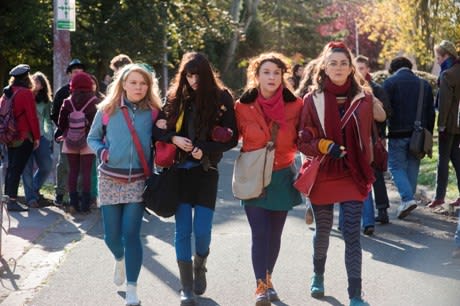It's not exactly a novel conceit to have a character travel back in time to a crucial moment in their own past (see Zac Efron in 17 Again if you dare or Big and 13 Going on 30 for the reverse-engineered trip into the future), so it's a little surprising to see the formula still being mined to such good effect in Camille Rewinds.
It doesn't re-invent the wheel by any stretch of the imagination, but instead casts a charming spell, bolstered by a carefully measured lead performance by its director and co-writer, Noémie Lvovsky.
When we first find Camille (Lvovsky), she is a floundering actress at the end of her thirties, relegated to a role as a victim in a horror movie where her only line is more of a gurgle. She is recently estranged from her husband, Éric (Samir Guesmi), and as they go through the process of selling their house, she self-medicates with booze. After a trip to visit a mysterious watchmaker and New Year's party with all her old friends in attendance, she wakes up to find that she is sixteen again.
There are some nice moments here, such as when Camille embraces the deceased parents she thought she would never see again, as they puzzle over what has got into their normally disaffected daughter. As she stays out late drinking and smoking with her friends just as she did before, Camille also continually attempts to spurn the advances of her rather persistent classmate, Éric, and avoid the rocky road she knows lies ahead of them.
Hidden around the somewhat predictable will-they-or-won't-they (again) romantic storyline are some intriguing sub-plots, not the least of which involves Camille's attempt to save her mother from suffering the aneurysm that she knows will kill her in a number of days. However, another in which she convinces a skeptical but sufficiently lecherous teacher of her unlikely time-travelling predicament feels a little extraneous.
Lvovsky has been in the industry for a long time now, making it easy to imagine there is something personal and reflective to her in the subject matter. The tone is mostly gentle and reassuring, though, with any twinges of melancholy or regret buried in the corners. It's an interesting choice to have Lvovsky play Camille at both ages and, even more so to have Guesmi do the same for Éric.
It helps give the impression that the universe has doubled back only for these two troubled lovers, to remind that there is an unquestionable inevitability to love.
It doesn't re-invent the wheel by any stretch of the imagination, but instead casts a charming spell, bolstered by a carefully measured lead performance by its director and co-writer, Noémie Lvovsky.
When we first find Camille (Lvovsky), she is a floundering actress at the end of her thirties, relegated to a role as a victim in a horror movie where her only line is more of a gurgle. She is recently estranged from her husband, Éric (Samir Guesmi), and as they go through the process of selling their house, she self-medicates with booze. After a trip to visit a mysterious watchmaker and New Year's party with all her old friends in attendance, she wakes up to find that she is sixteen again.
There are some nice moments here, such as when Camille embraces the deceased parents she thought she would never see again, as they puzzle over what has got into their normally disaffected daughter. As she stays out late drinking and smoking with her friends just as she did before, Camille also continually attempts to spurn the advances of her rather persistent classmate, Éric, and avoid the rocky road she knows lies ahead of them.
Hidden around the somewhat predictable will-they-or-won't-they (again) romantic storyline are some intriguing sub-plots, not the least of which involves Camille's attempt to save her mother from suffering the aneurysm that she knows will kill her in a number of days. However, another in which she convinces a skeptical but sufficiently lecherous teacher of her unlikely time-travelling predicament feels a little extraneous.
Lvovsky has been in the industry for a long time now, making it easy to imagine there is something personal and reflective to her in the subject matter. The tone is mostly gentle and reassuring, though, with any twinges of melancholy or regret buried in the corners. It's an interesting choice to have Lvovsky play Camille at both ages and, even more so to have Guesmi do the same for Éric.
It helps give the impression that the universe has doubled back only for these two troubled lovers, to remind that there is an unquestionable inevitability to love.
